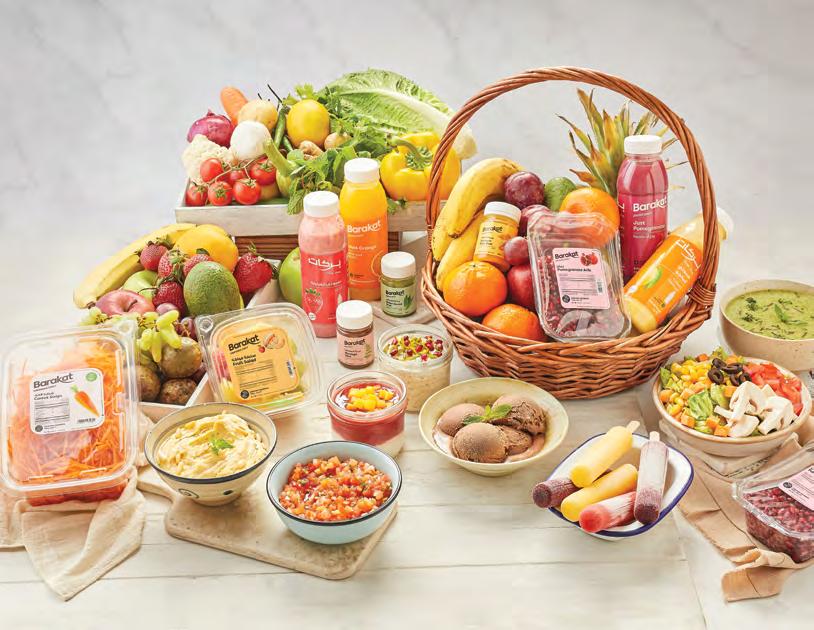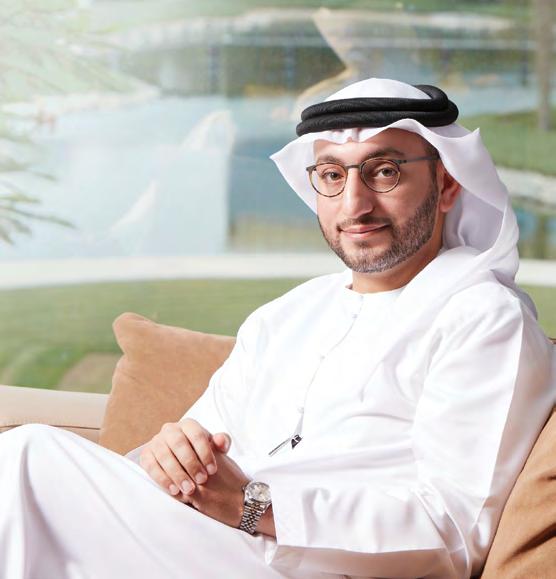
5 minute read
E-COMMERCE
A BITE OF THE ECOMMERCE MARKET
Dubai’s food producers see a lucrative appeal is taking their business online as more and more consumers head to the digital space to purchase goods and services
Advertisement
paradigm shift in food manu-
Afacturing is under way, as local producers bolt-on eCommerce platforms to capitalise on a booming market to offer consumers everything from dates to baked goods at wholesale prices.
It comes against the backdrop of an invisible virus that caused havoc to global supply chains and sent online sales skyrocketing as shoppers moved online to make daily purchases. For many companies that experienced forced closure of customer-facing branches, such as nonessential shops and restaurants, eCommerce was the only way to ensure their survival during the pandemic. Last year, over two billion people across the globe purchased goods or services online, and the total value of eRetail sales surpassed USD4.2 trillion.
Moreover, a third of UAE consumers have been shopping online more frequently following the outbreak of COVID-19.
Product categories that reported the greatest surge in purchases initially included health supplies, especially personal protective equipment, as well as electronics required for remote working and home entertainment. As the pandemic wore on, food and beverages, alongside home improvement goods and personal care products saw boosted online sales.
BENEFITS OF GOING ONLINE
In a bid to strengthen their offerings and expand their reach in the UAE market, local food producers based in Dubai Industrial City, one of the largest industrial hubs in the region, have realised the benefits of going digital.
Dofreeze, a packaged bakery snack company that exports products to over 50 countries, rolled out its eCommerce site in April 2020. But it was not until September that the brand saw an increase in sales.
Following healthy demand, the company plans to expand its offering with a wider product selection and greater visibility. It does, however, admit to facing “a challenge” in finding a third-party logistics delivery service that covers all areas.
“We have always tried to set a high standard when it comes to innovation in the baked snack market and introducing an easier way for customers to buy our products seemed like an obvious way to do that,” says Aamer Fayyaz, CEO at Dofreeze.
“Whether it is cookies, brownies, or everything in-between, providing a wide range of delicious bakery goods at competitive prices with more convenience is extremely important to us. We’re delighted to have made many of our delicious treats available online and look forward to expanding our range in the coming months as more regional consumers embrace eCommerce.”
INCREASING BOTTOM LINE
Meanwhile, Barakat, a local market leader in fresh juices and pre-packaged fruits and vegetables, whose newly redesigned packaging is a staple on the shelves of every reputable supermarket in the UAE, witnessed a much more pronounced impact on its bottom line.
A stalwart of the regional market since its inception in 1976, the company launched its e-commerce platform www. barakatfresh.ae in April 2018 and added an app on iOS and Android in August 2020 to enhance convenience for mobile users.
In 2020, after the pandemic struck, the brand saw its business quadruple compared to the previous year, and the momentum continues to date. Under the tagline ‘Best of Fresh’, Barakat stocks more than 800 varieties of fruits and vegetables from around the world,
in addition to fresh products, such as juices, immunityboosting shots, cut vegetables, fruit platters and baskets.
The company is building its portfolio in line with its global demand for healthy eating. And to cater to the proliferation of home chefs, the brand has launched a range of fresh ready-to-cook solutions and cooking ingredients.

DRIVING GROWTH
eCommerce has been a significant growth driver for the manufacturing business as well. Barakat owns and operates an end-to-end chilled supply chain, where the produce is maintained at perfect storage temperatures to retain freshness till the customer’s doorstep. The central warehouse serves the entire UAE, offering the company complete control over handling, quality, and hygiene.
Al Barakah Dates – which recently announced plans to establish the world’s largest privately-owned date factory – launched its eCommerce site in July 2020 in direct response to the changing shopping patterns of consumers. The move resulted in 20% growth in total local sales during the pandemic.
“We sell our products by the carton on our website, similar to a factory outlet or a cashand-carry, where customers pay far lower prices when they buy in bulk,” explains Managing Director Yousuf Saleem.
“We’re currently selling online in the UAE only, and are now working to grow the model to reach international consumers, too.”
To support its ambitions, in March 2021, the company announced plans to expand its existing facility in Dubai Industrial City into the world’s biggest privately owned date factory. It will have the capacity to process over 100,000 tonnes of dates and date products annually – almost half of the UAE’s domestic harvest. The 600,000 sq ft sustainable facility, powered by more than 6,500 solar panels, is scheduled for completion in early 2022.
OPPORTUNITIES IN ECOMMERCE
“Food producers based in Dubai Industrial City play a key role in enhancing the UAE’s food security and

Saud Abu Al-Shawareb, Managing Director of Dubai Industrial
self-sufficiency – one of the priorities of our country’s post-pandemic recovery plans as we build a competitive knowledge and innovationbased economy,” says Saud Abu Al-Shawareb, Managing Director of Dubai Industrial City. “Recent events have demonstrated the importance of robust and sustainable food supply chains, and pivoting to eCommerce, agile manufacturers have given consumers greater convenience and access to healthy goods at competitive prices.
“It’s great to see our partners adjust their operation model to expand into new high-growth sectors and our business district was designed to provide companies with the flexibility to expand and capitalise on the opportunities in eCommerce,” he adds.
Speaking on the advantages of having a presence in Dubai Industrial City, Rashid Mohamed Alabbar, Board Member of the Barakat Group of Companies, says: “The proximity to the port facilitates clearance, which saves valuable time and avoids loss of quality in transit for fresh produce. Barakat delivers this freshness advantage to its customers through a robust supply chain specialized in handling fresh, built over 44 years of operations in the UAE.”
Meanwhile, Al Barakah Dates’ Saleem values the cooperation and support of the team at Dubai Industrial City and the proximity of the business district to Jebel Ali Port as well as easy access to all emirates.
“eCommerce has the potential to take companies to the next level. But this requires solid infrastructure. Our industrial ecosystem is ideally positioned to serve the specialised needs of key players in the food sector and support them in scaling up production and expanding their businesses,” concludes Abu Al-Shawareb.


